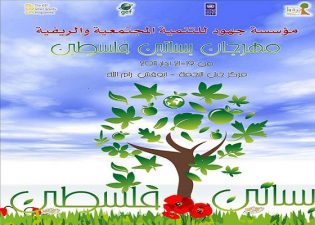We at Green Prophet have been charting the rising popularity of organic food in Israel for some time now.
One of the biggest suppliers of free-range organic eggs in Israel is Givot Olam, a Jewish farm located in the West Bank.
While you’d think that politics and food don’t mix, there are some who disagree.
According to a recent article in Marketplace, there’s a growing concern among some segments of Israel’s population–they don’t want to support West Bank settlements by buying their organic products. Since organic products are often not labeled to denote origin, this creates what some feel is a political predicament. Not a huge one, mind you, since West Bank products constitute only a tiny percentage of organic products in Israel.
Conversely, there are people who actively seek out organic products from the West Bank, for opposite and still political reasons.
Anyone still in the mood for eggs? It only seems appropriate to have them scrambled, in this case.




We have a free market economy in Israel.
Everyone is free to decide what is important to them.
I am in favor of supporting organic farming, whatever the source.
The greater the market for organic produce, the cheaper organic produce will become. The cheaper the produce, the more people will purchase organic products. And so on….
Organic farming is better for people and better for the earth.
But you can decide what is important to you.
If you prefer, you can purchase all of your produce from the Arab market. If you think they are so environmentally conscious, then go ahead. Their produce is certainly less expensive. So, you can save money and support the Arab population.
But, don’t kid yourself. Giv’ot Olam is growing and flourishing.
If a few radicals stop purchasing their products, the yishuv will still grow.
Giv’ot Olam is producing many high-quality organic produce, including organic goat’s milk, organic goat-milk yoghurts, organic goat cheese, etc.
As we say in my family, “if you don’t like it, more for me!”
Yair – of course the settlements are an issue, if not one of the biggest that Israel has to face. Not to mention the massive irony of being friendly to nature, on the one hand, and keeping the 90% of the residents of the territories under military occupation, on the other.
Many Israelis choose not to buy settlement products – and even more would do so if they knew about the true costs of the settlement project to Israeli (not to mention, Palestinian) society, and also if there place of origin was clearly labelled (Givaot Olam’s eggs generally are not).
‘Jameel’ – The chances of Beitar being fined or otherwise punished for polluting their Palestinian neighbours is just as likely as them, or other settlements, being brought to justice for the last they have effectively snatched from them to build their homes (40% of the land West Bank settlements are built on is privately-owned Palestinian land – including the fluffy organic egg farm which doesn’t even have approval under Israeli law).
Jameel and Yair,
The post you are commenting on is not meant to represent a particular political viewpoint. The original purpose of the post was to raise awareness of this issue without injecting it with my own personal opinion.
If you try to guess my political views based on this post alone, you will probably get it wrong. You are within your rights to argue, but please bear in mind that sometimes we report the existence of an issue without going into our own political views of that issue.
-Ilana
I can’t believe this is even an issue…
Me and several other evil, horrible settlers spent last week cleaning up a hilltop which was abandoned by Sharon 2 years ago only to be turned into a garbage dump by our environmentally conscience neighbors.
Michael – I’m sorry to hear about the Beitar residents dumping rubble (and guess what? I agree with you that its a horrible thing and they should be fined, forced to clean up their mess, and act responsibly).
In the Shomron where I live, there are serious conservation projects going on in many settlements.
The environment is something that should concern all parties at hand — and the politicization of environmental issues by hyping up an article about marginal numbers of political leftists refusing to buy organic eggs from settlers accomplishes absolutely nothing whatsoever for the environment.
“Jameel”: “The Jewish settlements are more and more environmentally conscious — which is good for the Israel and for the West Bank.”
In November I visited the Palestinian village of Wadi Fukin 1km east of the green line and the neighbouring Israeli town Tsur Hadassah to the west. Wadi Fukin has been using traditional methods of water conservation and agriculture for generations, in spite of the massive settlement of Beitar Illit to the east. The small village is being eaten up by huge piles of building rubble dumped on their land and many fields are polluted with sewage being poured onto them by the settlement. On the plus side, Fukin’s farmers have started selling organic vegetables to Tsur Haddasah and other Israeli communities.
http://www.jpost.com/servlet/Satellite?cid=1196847269878&pagename=JPost%2FJPArticle%2FShowFull
“politics shouldn’t be an ingredient in organic food”
Your article bends a few important facts from Marketplace:
1. [Givot Olam] has become one of the biggest producers of organic and free-range eggs in Israel — not, “West Bank products constitute only a tiny percentage of organic products in Israel.”
2. [Organic products from the West Bank] It also doesn’t seem to bother most Israeli consumers. Either that, or they’re not reading the small print. The Israeli organic food industry grew 30 percent this year. — not, “There’s a growing concern among some segments of Israel’s population”
The Jewish settlements are more and more environmentally conscious — which is good for the Israel and for the West Bank. I could go on and on about the detrimental actions of the Palestinian population on the environment, (like when will the PA in Nablus stop dumping toxins into the mountain aquifer, Israel’s primary water source?)
Its unfortunate when people put politics ahead of the environment; seems like biting your nose to spite your face.
More on Givaot Olam here: http://www.jewcy.com/post/organic_and_illegal_israeli_farms_west_bank#
I was at the farm last week too. It is a truly amazing place with breathtaking views, the product of dedication and hard work by Avri Ran, farmer and so-called ‘father of the hilltop youth’.
But whether one likes it or not, buying products from Givaot Olam and other West Bank settlements means buying into the ideology of the settlers + all the ‘free-range’ chickens I saw were cooped up ;-(
Most organic eggs in Israel come from Ran’s farm. Arguably, if people didn’t buy them, the settlement wouldn’t be flourishing like it is.
Nice work, picking up this story. I visited the farm and blogged about it at http://thetruthherzl.blogspot.com/2008/05/free-range-eggs-revisited.html.
Have you seen the story on Gazans using used felafel oil to power their cars? http://www.reuters.com/article/worldNews/idUSL2957154320080430?feedType=RSS&feedName=worldNews